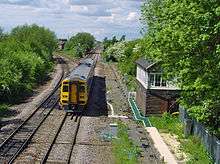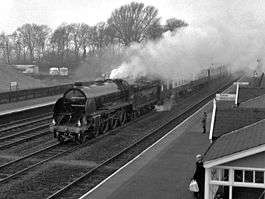Gilberdyke railway station
| Gilberdyke | |
|---|---|
|
Southern Railway 'N-15/King Arthur' at Gilberdyke station with a charter train prior to the station remodelling (1982) | |
| Location | |
| Place | Gilberdyke |
| Local authority | East Riding of Yorkshire |
| Coordinates | 53°44′52″N 0°43′48″W / 53.7479°N 0.7300°WCoordinates: 53°44′52″N 0°43′48″W / 53.7479°N 0.7300°W |
| Grid reference | SE837286 |
| Operations | |
| Station code | GBD |
| Managed by | Northern |
| Number of platforms | 2 |
| DfT category | F2 |
|
Live arrivals/departures, station information and onward connections from National Rail Enquiries | |
| Annual rail passenger usage* | |
| 2011/12 |
|
| 2012/13 |
|
| 2013/14 |
|
| 2014/15 |
|
| 2015/16 |
|
| History | |
| Key dates | Opened 1840 |
| National Rail – UK railway stations | |
| * Annual estimated passenger usage based on sales of tickets in stated financial year(s) which end or originate at Gilberdyke from Office of Rail and Road statistics. Methodology may vary year on year. | |
|
| |
Gilberdyke railway station is a railway station that serves the village of Gilberdyke in the East Riding of Yorkshire, England. It was opened in 1840 by the Hull and Selby Railway, and until 1975 it was known as Staddlethorpe station. Today it is operated by the Northern train operating company. Situated 17 miles (27 km) west of Hull, it is the junction for the lines to Selby and to Goole & Doncaster
History
Staddlethorpe station was opened by the Hull and Selby Railway in 1840. The original facilities included a water station, with a 1,250,000 imperial gallons (5,700 m3) reservoir and pumping engine.[1]
In 1842 a train guard slipped in wet weather, falling off the platform under moving coal wagons, resulting in very serious injuries leading to his death.[2] In 1850 a train from Hull to Normanton had one of its engine's boilers explode near the station. Both the driver and fireman were badly scalded, and the fireman broke a leg.[3]

In 1869 the Hull and Doncaster Branch opened, branching south-westwards from a junction just west of the station.[4][5]
At around the end of the 19th century a goods shed, and sidings serving a creosote works were established south of the station. In the same period the line through here and on towards Brough was increased to four tracks.[5][6] The reservoir was filled in in 1903.[7] In the mid-1980s, the platform loop lines were removed (reducing the line to two tracks again) and the platforms themselves extended outwards to reach the remaining running lines.
The works and area south of the station was redeveloped as an industrial estate in the 1970.[8]
From 7 January 1975 the station became known as Gilberdyke station.[9]
In 2006 a planning application was accepted for the demolition of the goods shed and the erection of three industrial units split into eighteen smaller business units.[10]
Present
Railway buildings that still exist include the Station Master's house and two adjacent cottages, and, on Broad Lane, a number of terraced cottages known as Station Cottages. The sidings south of the station have been replaced by an industrial estate "Gateway Business Park".
The station is now an unmanned halt and has no ticketing facilities - passengers must purchase these on the train or prior to travel.[11] Shelters are located on each platform, along with digital information screens. Train running details can also be obtained by telephone and timetable posters.
The station does not have step free access to the westbound platform (as it is accessible only via footbridge), meaning that disabled passengers may book assistance in advance or travel via Brough station where step free access is available.
Services

The station is operated by Northern. The station is served hourly in each direction on weekdays by local trains between Hull and Doncaster. Some York trains also call here, along with a limited service (one departure per day) to Leeds and Manchester Piccadilly operated by TransPennine Express. On Sundays there is an hourly service to Hull and Sheffield.[12] These continue eastbound to either Bridlington or Scarborough.
| Preceding station | |
Following station | ||
|---|---|---|---|---|
| Northern | ||||
| Northern | ||||
| Howden Selby on Sundays |
TransPennine Express North TransPennine |
Brough | ||
References
- ↑ Whishaw, Francis (1842), The Railways of Great Britain and Ireland Practically Described and Illustrated (2nd ed.), J. Weale, p. 166 , alt. link
- ↑ "Report of the Officers of the railway Department", The Sessional Papers of the House of Lords, William Clowes and Sons, 13, Appendix I. Returns of Accidents - Hull and Selby Railway, p.2, 1843
- ↑ "Appendix No. 25 York and North Midland Railway Bursting of a boiler of a locomotive engine (September 13, 1850)", Reports of the commissioners, 3 of 9 in v.30, p. 36, 4 February – 8 August 1851
- ↑ Hobson, Bernard, East Riding of Yorkshire, Cambridge University Press, p. 144
- 1 2 Ordnance Survey. 1:2500. 1890
- ↑ Ordnance Survey. 1:2500. 1909
- ↑ The Journal of Botany, British and Foreign, 41, 1903, p. 116,
.. the large pool near Staddlethorpe Station [.] has been filled up by the North-Eastern Railway Company for railway improvements.
- ↑ Ordnance Survey. 1:2500. 1970-1, 1981
- ↑ "For Staddlethorpe read Gilberdyke", The Railway Magazine: 96, 1974
- ↑ (06/07590/STPLF) Erection of 3 buildings containing 18 No. industrial units, East Riding of Yorkshire Council, 22 September 2006
- ↑ Gilberdyke station facilities National Rail Enquiries; Retrieved 6 December 2016
- ↑ Table 29 National Rail timetable, December 2016
External links
| Wikimedia Commons has media related to Gilberdyke railway station. |
- Train times and station information for Gilberdyke railway station from National Rail
